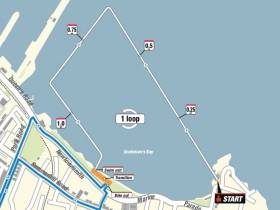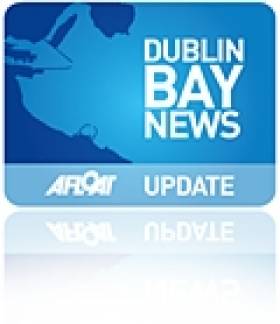Displaying items by tag: Ironman 703
Ireland’s national governing body for triathlons says it did not sanction the swim event at the weekend in which two men died in separate incidents.
Afloat.ie previously reported on the tragedies in Youghal on Sunday (20 August) during the Ironman 70.3 event.
The two deceased have since been identified as Ivan Chittenden (64) from Toronto and Brendan Wall (45), originally from Slane but most recently living in the UK, according to RTÉ News.
They had been taking part in the swim portion of the event at Claycastle Beach in the East Cork town on Sunday morning, where sea conditions were visibly choppy.
In a statement, Triathlon Ireland said its technical officials attended before the start of the event to review the conditions and carry out a water safety assessment.
“Due to adverse conditions on the day, Triathlon Ireland Technical Officials confirmed to the race organisers that it was not possible to sanction the race,” it added.
Gardaí say they have ruled out any criminal investigation into the weekend’s tragedies, but noted that witness statements will be included with post-mortem in a file for the coroner.
RTÉ News has more on the story HERE.
Two Men Die During Swim Portion of Ironman Triathlon in East Cork
RTÉ News reports that two men have died in separate incidents during the swimming portion of a triathlon in East Cork on Sunday morning (20 August).
A man in his mid-60s and another man in his mid-40s were both pronounced dead at the scene in Youghal during the Ironman 70.3 event.
In a statement, organisers said: “We share our greatest sympathies with the families and friends of the athletes and will continue to offer them our support as they go through this very difficult time.
"We thank the safety personnel and first responders who worked quickly to provide the athletes with medical assistance.”
It’s understood that the event continued after the incidents with a 90km cycle and long-distance run. More on the story HERE.
Dun Laoghaire Ready For IRONMAN 70.3 Triathlon This Weekend
Ireland’s biggest triathlon of 2019 comes to Dun Laoghaire this weekend as IRONMAN 70.3 Dun Laoghaire brings premier athletes from across the island and around the globe to Dublin Bay.
Sunday 25 August is the date for the three-part race that comprises a 2km swim from Sandycove around Scotsman’s Bay, a 90km cycle route that rounds the Wicklow Mountains via Roundwood, and a 21km run finishing at Dun Laoghaire Harbour.
Dun Laoghaire-Rathdown County Council has listed a number of temporary road closures throughout the town and surrounding areas over the weekend around the event.
Local access will be maintained where possible and diversions clearly signposted, the local authority says.
Dublin Bay Gets Nod As Ironman Triathlon Returns To Ireland
#Ironman - The Ironman 70.3 triathlon is set to make its return to Ireland next year as The Irish Times reports Dublin will stage a date of the 31-stop series in August 2015.
Previously the athletic challenge was held in Galway in August 2011 and again the following year, when more than 2,000 participants blew away local swimming ban concerns to swim 1.9km along Salthill promenad before a 90km cycle through Connemara and a 21.1km run through the streets of Galway's old-town Claddagh district.
But funding issues resulted in its cancellation last year, despite some 1,600 people having registered to take part eight months in advance.
However, Galway's loss is the capital's gain, and Dublin will play host to an expected 3,000 triathletes swimming in Dublin Bay, cycling through the Wicklow Mountains and running through the city centre's thoroughfares.
And that's not all, as outgoing Dublin Lord Mayor Oisín Quinn also announced that Dublin will see a full-distance triathlon in 2016. The Irish Times has more on the story HERE.






























































